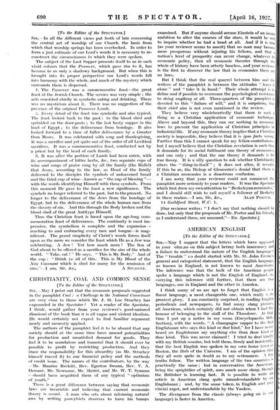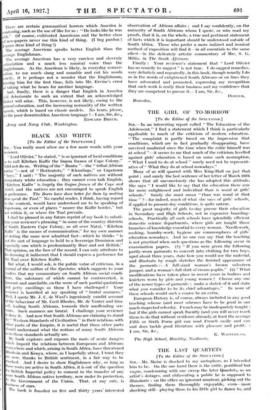AMERICAN ENGLISH
[To the Editor of the SPECTATOR.] SIa,—May I suggest that the letters which have appeared in your olumns on this subject betray both inaccuracy and a failure to understand the nature of the English language ? The " trouble " L.0 doubt started with Mr. St. John Ervine s general and categorical statement, that the English language, as known in England, is not known to most Americans. The inference was that the bulk of the American people spoke a language which is not the English of England, or. carrying this inference still further, that there arc tv,, languages, one in England and the other in America.
I think many of us are apt to forget that English i; ,t fluent language, a most changeable one, which really is iti greatest glory. I am constantly surprised, in reading English periodicals and newspapers, to find ninny slang phrases, all American, which certainly did not obtain when I had the honour of belonging to the staff of the Thunderer. At that time I put up a notice in my room (Encyclopaedia Brit. Section), with the words, " A champagne supper to the first Englishman who says this. kind or that kind," for I have never heard an Englishman say anything else than those kind or these kind. This was never claimed ! I tried to deal kindly with my British cousins, but told them, firmly and insistently. that the best English was spoken in my own home town of Boston, the Hub of the Universe. I am of the opinion that they all were quite in doubt as to my seriousness. -% few truths follow. The written language of the two countries e; practically the same ; but in conversation the American, being the sprightlier of spirit, uses much more slang, though the Britisher is learning fast.. It is possible to write an article in American slang quite ununderstandable by al' Englishman ; and, by the same token, in English and pro- vincial argot, not understandable by the Yankee.
The divergence from the classic (always going on in (Ai r language) is faster in America. 3 dnewspapers never use this kind of thing. (I beg pardon !
Ieragc Englishman.
.ek." Of course, cultivated Americans and the better class
mean these kind of thing !)
There are certain grammatical horrors which America is adoning, such as the use of like for as : " He looks like he was The average American speaks better English than the v The average American has a very careless and slovenly zirtieulation and a much less musical voice than the Englishman. As the American is likely, in everyday conver- salon, to use much slang and mumble and cut his words cruelly, it is perhaps not a wonder that the Englishman, ea ring him for the first time, falls into Mr. Ervine's error if taking what he hears for another language.
And, finally, there is a danger that English in America deteriorate to such an extent that an acknowledged dialect will arise. This, however, is not likely, owing to the general education, and the increasing normality of the written ,peech, which is based on classic models. No tears, please, or the poor downtrodden American language !—I am, Sir, &c., EDWARD BRECK. Army and Nary Club, Washington.



































 Previous page
Previous page